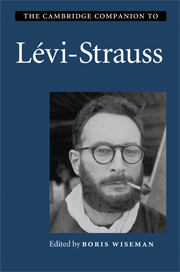Book contents
- Frontmatter
- Introduction
- Part I: Society and culture
- 1 Lévi-Strauss and the question of humanism followed by a letter from Claude Lévi-Strauss
- 2 Lévi-Strauss and history
- 3 Structure and exchange
- 4 The future of the structural theory of kinship
- Part II: Myth and mind
- Part III: Language and alterity
- Part IV: Literature and aesthetics
- Bibliography of works by Claude Lévi-Strauss
- Index
1 - Lévi-Strauss and the question of humanism followed by a letter from Claude Lévi-Strauss
from Part I: - Society and culture
Published online by Cambridge University Press: 28 January 2010
- Frontmatter
- Introduction
- Part I: Society and culture
- 1 Lévi-Strauss and the question of humanism followed by a letter from Claude Lévi-Strauss
- 2 Lévi-Strauss and history
- 3 Structure and exchange
- 4 The future of the structural theory of kinship
- Part II: Myth and mind
- Part III: Language and alterity
- Part IV: Literature and aesthetics
- Bibliography of works by Claude Lévi-Strauss
- Index
Summary
Were we to distinguish the themes purposely adopted as part of a theoretical undertaking from those imposed by an era, then undoubtedly for Lévi-Strauss 'the question of humanism' belongs to the second category. A systematic history of the 'humanist' theme in twentieth-century Europe and notably in post-war France should one day be written. It could not remain a pure history of words and ideas, but would necessarily overflow into social and political history and would encompass what one could call the competition between ecclesiastical forms (church, political parties, intellectual chapels) associated, in the same period, with an exceptionally important and manifest 'ideological' demand. This is as Michel Foucault somewhat bluntly stated in a 1981 interview:
One cannot imagine into what a moralistic pond of humanist sermons we were plunged in the post-war period. Everyone was a humanist. Camus, Sartre, Garaudy [the official philosopher of the Communist Party] were all humanists. Stalin was a humanist too . . . This does not compromise humanism, but simply allows us to understand that at that time I could no longer think in the terms of that category. (Foucault 2001: 1485-6)
In the aftermath of the Second World War, in a country where the main political parties believed that they bore a message, and where the 'intellectuals' themselves spoke in the name of all, the restoration of a certain confidence in the future of humanity had seemed a priority, just as the reconstruction of cities and economies had been from the outset. Hence, the recurrence of the question which was asked, in various ways, to whoever intended to make a contribution to intellectual life: 'As for man, what do you make of man?'
- Type
- Chapter
- Information
- The Cambridge Companion to Lévi-Strauss , pp. 19 - 38Publisher: Cambridge University PressPrint publication year: 2009
- 3
- Cited by

